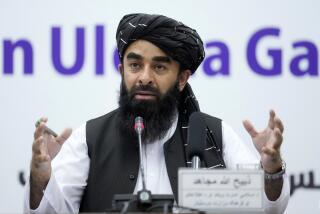Rice Promises More Support for Afghanistan
- Share via
KABUL, Afghanistan — Returning to an Afghanistan troubled anew by insurgent attacks and civilian unrest, Secretary of State Condoleezza Rice on Wednesday promised additional U.S. financial support and a focus on small-scale projects designed to improve daily life more quickly than massive reconstruction efforts.
Rice said that the country continued to face “strong enemies, and they’re ruthless,” but that Islamist militants would “not succeed in rolling back ... the democratic gains” achieved since the Taliban was overthrown in 2001.
Her five-hour visit offered a public demonstration of the Bush administration’s efforts to reassure a population that has moved restively beyond the optimism that followed the Taliban’s ouster and is expecting tangible improvements from the U.S.-supported government of President Hamid Karzai.
Rice visited Afghanistan in October, and again on March 1 with President Bush in a surprise stop on his way to Pakistan and India. Since then, an insurgent rocket has landed near the U.S. Embassy, fighting has flared in southern Afghanistan and dissatisfaction with the Karzai government has erupted in riots that serve as a reminder of the nation’s needs.
The secretary of State offered expressions of confidence in Karzai’s ability to gain the upper hand, and made references to the country’s movement toward democracy in the last 4 1/2 years, tempered by only passing acknowledgement of the country’s daunting problems.
She said the government here was facing “ruthless people who raped and pillaged and tried to destroy the country.”
“There are a small number of them who are still trying to destroy the country, but they will not succeed,” Rice said at a news conference with Karzai in a garden of the presidential palace.
Insurgent attacks have been stepped up as the deployment of North Atlantic Treaty Organization troops approaches. British, Canadian and Dutch forces are due to take over from U.S. units in southern Afghanistan. NATO defense ministers this month reaffirmed their plan to send 7,000 troops to the region by the fall.
“It’s not an unraveling situation,” said a senior State Department official who asked to remain anonymous because he was discussing a private meeting with the Afghan president. But, he said, “It’s a very dangerous situation. There is a tense effort by the Taliban that we have to successfully counter.”
Meanwhile, signs of discontent have been growing within the U.S.-led coalition. Karzai last week called for a broader approach to fighting terrorism, saying that instead of just hunting down militants, more emphasis should be put on countering their financial support, training and equipment and motivation.
In addition, Karzai and the government of Pakistani President Pervez Musharraf have been sniping at each other over what they say is an insufficient sharing of intelligence and a failure to crack down on militants in the generally lawless lands along their shared border. One result is that Afghan police units, challenged by Taliban fighters, have turned to drug lords’ militias for protection.
Rice and Karzai met for more than an hour. She flew here from Islamabad, Pakistan, on her way to Moscow for a conference of foreign ministers of the Group of 8 industrialized nations and a meeting with Russian President Vladimir V. Putin.
The senior official, who spoke with reporters on the flight to Moscow, said Rice did not discuss how much additional money the United States would provide to Afghanistan. He said it would pay for such projects as road construction, irrigation and rebuilding a local police force -- “the kind of benefits people want” -- while work also proceeds on such priorities as major highways and power transmission facilities.
Emergency spending legislation that President Bush just signed would also provide money to Afghanistan.
The visit to Kabul, the Afghan capital, occurred at a moment of new attention to Karzai’s immediate challenges. Rice and others traveling with her this week have pointedly emphasized the progress Afghanistan has made since the U.S. invasion in October 2001.
But the country is facing new efforts by the Taliban, allied with Al Qaeda, to destabilize distant provinces and exert new authority over tribal regions, in a campaign that goes beyond the spring offensives.
Each spring, insurgents have increased their raids on government outposts and supporters. But this year, they reportedly have launched broader military operations, giving rise to concerns of renewed strength.
Karzai is sometimes derided as the “mayor of Kabul” because his government exercises only limited authority in regions beyond the capital. He took issue with that idea Wednesday, saying that he had recently visited the country’s south and seen evidence of progress.
More to Read
Sign up for Essential California
The most important California stories and recommendations in your inbox every morning.
You may occasionally receive promotional content from the Los Angeles Times.













